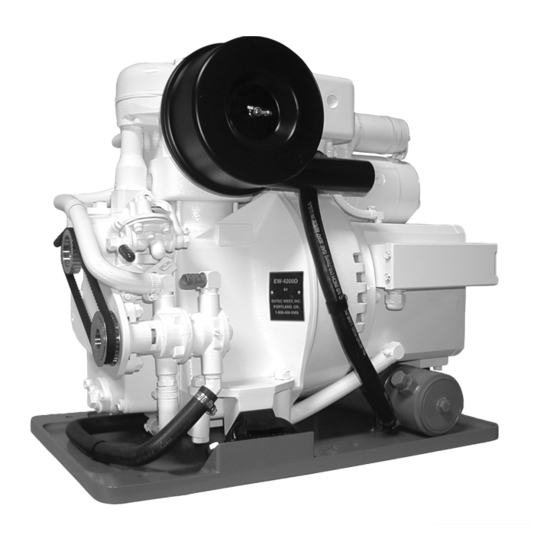- ページ 19
ポータブル発電機 Entec EW-4200DのPDF 取扱説明書をオンラインで閲覧またはダウンロードできます。Entec EW-4200D 19 ページ。 Marine diesel generators

Theory of Operation
EW-4200D
Injection Pump and Injector. The injection pump is like a
miniature piston and cylinder with a special valve. When the
miniture piston is pulled down, fuel is drawn into the cylinder.
When the piston is pushed up, the fuel is forced through a
special check valve and into the high pressure pipe (11/11)
leading to the injector. The pipe is full of fuel, so whatever
quantity is forced into the pipe at the injection pump end, must
come out at the injector end and into the injector. The injector is
a special combination check valve and atomizer that will open
when the pressure in the pipe reaches 2,900 psi. The injector has
a tip with tiny holes that causes the fuel to be sprayed as a fine
mist, or atomized. At the top of the compression stroke the fuel
is sprayed into the very hot compressed air and ignites.
Ignition Temperature. To reach ignition temperatures during
the compression stroke, the piston must travel at a fast enough
speed to prevent the loss of heat. A weak battery, or dirty cable
terminals, etc. will not turn the engine fast enough to prevent the
heat loss.
The same is true for hand cranking speed. A timid hand cranker
will never start the engine by hand.
Fuel Efficiency. The injection pump is controlled by the engine
governor (7/12 & 13) and throttle control (5/1 –13) system that
tells the injection pump how much fuel should be delivered to
the injector. This quantity is established every single time the
engine reaches the end of the compression stroke. You can think
of the fuel flow as a series of fuel "slugs," happening at a rate of
1,800 times per minute for our 60 cycle generator. The injection
pump always delivers just the right quantity fuel that the gover-
nor demands, to produce the horsepower needed, to make the
exact amount of electrical power the vessel needs at any given
point in time.
If the generator load was 30 amps, then calculate 0.4 gallon per
hour fuel consumption, divided by 60 minutes per hour, and
divide that by 1,800 injection pulses per minute, and you can get
an idea of how small each "slug" of fuel is.
For Example: 231 cubic inches of fuel in a gallon, multiplied by
0.4, divided by 60, then divided by 1800, equals 0.00086 cubic
inches of fuel per "slug".
231
0.4
60
1800
0.00086
If the load was 10 amps, the "slug" would be approximately 1/3
of 0.00086 cubic inches, or 0.00029 cubic inches.
Entec West, Inc.
19
16710 SW 72nd • Portland, Oregon 97224 • (503) 624-7118
